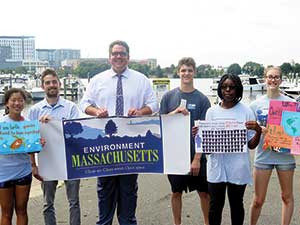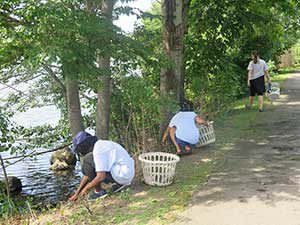
Environment Massachusetts and State Representative Mike Connolly advocated to end the use of polystyrene, during a cleanup of the Mystic River. — Photos by Shira Laucharoen
By Shira Laucharoen
Staff members from advocacy organization Environment Massachusetts participated in a cleanup of the Mystic River on August 9, during which they spread the word about their campaign to ban foam cups and containers in the state.
At the event, held at the Mystic Wellington Yacht Club, State Representative Mike Connolly, who serves East Somerville and East Cambridge, voiced his support for legislation that may come out of the campaign.
“The message is clear: we need to curb the flow of single use plastic that is destroying our marine and freshwater ecosystems,” said Environment Massachusetts’s Cambridge campaign director Jake Taber.
Over the summer, Environment Massachusetts has held its Wildlife Over Waste campaign, arguing for a statewide ban on cups and takeout containers made from single use polystyrene, commonly known as Styrofoam. Across the organization’s three offices in Cambridge, Boston, and Amherst, staff knocked on over 100,000 doors and collected more than 16,000 petitions.
Polystyrene is a persistent material that breaks apart into non-biodegradable microplastics that can cause harm to the rivers and oceans it pollutes. Animals may ingest plastic waste that can block their digestive tracks, and scientists have found plastic fragments in 86 percent of sea turtle species.

Staff members from Environment Massachusetts and the Mystic River Watershed Association collected trash from the shoreline of the Mystic River.
“Our economy is a single stream unidirectional economy, in which we produce things to be used once and then to be thrown away,” said Taber. “We have to look at the entire economy and how it is structured.”
Team members from Environment Massachusetts collaborated with the non-profit Mystic River Watershed Association to clean-up the shoreline of the Mystic River and parts of MacDonald Park. Participants collected three full bags of trash, removing plastic bags embedded in the dirt, cans, and bottles.
Massachusetts has made strong efforts to reduce dependence on plastics like polystyrene, with 30 communities, including Somerville, having placed bans on Styrofoam. While programs from organizations like Environment Massachusetts have faced opposition from plastic companies, these movements are seeing results. Across the country, over 200 cities have passed plastic foam bans.
On a corporate level, companies such as McDonald’s have made plans to stop using foam cups and containers across the world by the end of 2018, while Dunkin’ Donuts will be eliminating Styrofoam cups by 2020. They will have to find biodegradable alternatives, said Taber, who suggested the use of cardboard and paper as options.
“This is an issue that goes beyond the Mystic River,” said Connolly. “The time is now for our state to take action and address it.”












For this to work, it needs to be nationwide, not just city-by-city. If you live near a state that doesn’t ban plastics, then people who go there to shop can still bring those plastics into their city.
Perhaps there should be ways to collect these plastics locally, either through regular recycling, or having drop-off boxes. I’ve often brought plastic bags to my local supermarket, where they have a box just for that purpose. People tend to be more cooperative if there is minimal inconvenience to them.
Also, if Environment Massachusetts wants to protect wildlife, then they need to start encouraging cities to open up more green areas and preserve more trees. You can’t protect wildlife if you keep having construction going on that pushes them out. That’s why more animals that were normally in rural areas have started coming into the city.
You can’t pick and choose which ways you want to help the environment. It needs to be done across the board, through waste management, green space preservation, and education.
It’s sad that some people still have to be told not to litter, but sadder still when our government continues to take away areas that wildlife need to thrive in for the sake of making money.